By Jean Baptiste Ndabananiye
In the intricate web of human history, there are moments where the lines between our past and present blur, revealing the deep scars of exploitation, violence, and suffering. The annihilation of the Incas, driven by the greed of colonizers, and the brutal history of Black slavery, where millions were torn from their homeland and forced into lives of unimaginable torment, serve as painful reminders of humanity’s darker chapters.
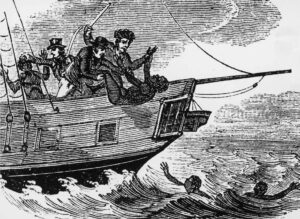
These injustices, rooted in history, are continuing to cast long shadows over the present, showing the profound ways in which our fates are intertwined. Modern technologies and global connectivity have turned the world into a village, where the stories of suffering and progress from one corner of the globe resonate in every other. Yet, in the midst of this interdependence, we find ourselves at a crossroads: how do we move forward in a world where past wrongs still demand our attention?
This article does not aim to place blame on any people but rather to illuminate the urgent need for a global shift—one rooted in empathy, mutual respect, and a commitment to healing. As we look back on the mistakes of history, we must ask ourselves: will we continue to perpetuate the same patterns, or will we choose a path of unity, compassion, and love that recognizes the intrinsic worth of every human being? The time to act is now. This article consists of these sections which will be explored in a series of articles:
- Where does the response to the questions lie?
- Past horrors should act as a reason for radical change, not an incessant reminder that some people are cruel
- General call to action
This article addresses the first section: where does the response to the questions lie?
Where does the response to the questions actually lie?
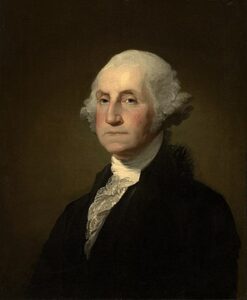
History has proven that the greatest leaders are often those who genuinely place humanity at the center of their vision. The late Nelson Mandela and General George Washington are shining examples of individuals who climbed to exceptional prominence, not merely through strategy or power, but through their profound love for people and an unyielding commitment to the common good.
Mandela’s relentless pursuit of equality in South Africa and Washington’s resolve to establish a free and united America embody leadership rooted in compassion and purpose. Their legacies remind us that exceptional leadership transcends personal ambition and stems from a desire to uplift and empower others. This article also explores how their humanity-driven approaches set them apart as iconic leaders who are continuing to inspire generations.
So, the answer, we believe, lies in a new era of compassion and love. Our shared experiences, including the inevitability of mortality, remind us that we are bound not only by our joys and triumphs but by our collective struggles. If we are truly united by the same fate, then we must rise above the divisions that have always separated us and then embrace the responsibility of caring for one another in a true way.
As afore-said, modern technologies have woven the world into a tightly interconnected global village, where the lives of Africans, Arabs, Europeans, Asians, and the Americas’ citizens are more intertwined than ever before. From trade and innovation to shared challenges like climate change and global health crises, the reality remains clear: we need one another.
This interdependence presents a profound opportunity—not just for cooperation and reciprocal understanding—but for nurturing a genuine love among people across continents. If our fates are so deeply linked, why not to adopt this as a chance to foster unity, compassion, and mutual respect?
Moreover, we also share the same hardships and challenges. In this interconnected world, the challenges we face—whether they be environmental, political, social, or even death—affect us all. From the rising tides of climate change to the shifting currents of global politics, and the inevitable truth of mortality, no one is truly isolated. Death, as a part of human experience, reminds us of the fragility of life and the interconnectedness of our shared existence. Our shared fate invites us to rethink how we relate to one another, urging us to build bridges of empathy, cooperation, and love, knowing that the well-being of one impacts the well-being of all.
An international peace-building organization, Search For Common Ground, says “Our world is more interdependent than ever before. The challenges before us require collaborative approaches. We believe that all individuals and relationships have the capacity to change. Despite the depth and complexity of our differences, we believe that Common Ground matters. When we reveal and amplify what we share, we can trigger collaboration in ways otherwise unimaginable.”
Prominent figures who have advocated for love
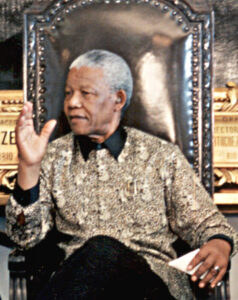
Some people may downplay ‘love’ or dismiss it as unattainable, regarding as more of a religious concept than a tangible, real-world virtue. Nevertheless, countless inspiring quotes on love—articulated not only by religious figures but also extremely renowned politicians—serve to dismantle this perception.
Nelson Mandela
“No one is born hating another person because of the color of his skin, or his background, or his religion. People must learn to hate, and if they can learn to hate, they can be taught to love, for love comes more naturally to the human heart than its opposite,” once declared the late Nelson Madiba Mandela—one of the most iconic and influential people that this globe has ever known— who served as the first Black South African president, after being released from prison where he passed 27 years.
A UN agency’s statement indirectly supports Mandela’s point that people must learn to love. ‘Since wars begin in the minds of men, it is in the minds of men that the defences of peace must be constructed’: Constitution of the United Nations Educational, Scientific and Cultural Organization (UNESCO).
The link between Mandela’s statement and the UNESCO’s Constitution stands in their shared emphasis on the power of human consciousness in shaping societal dynamics. Mandela’s words underscore the idea that hatred is learned, suggesting that if people can be taught to harbor hate, they can equally be taught to love. This speaks to the transformative potential of education, awareness, and empathy in fostering positive change.
Similarly, UNESCO’s statement highlights that the foundation of peace lies in the attitudes and beliefs of individuals. Both quotes affirm the pivotal role of the human mind in determining the course of human interactions, whether it be through the cultivation of hatred or the nurturing of peace and love. Mandela and UNESCO call for an active effort to shape minds towards positive values, recognizing the capacity for growth and transformation in individuals as the key to building a more harmonious world.
Mandela also once said “As I walked out the door toward the gate that would lead to my freedom, I knew if I didn’t leave my bitterness and hatred behind, I’d still be in prison.” This quote represents one of his principles that have allowed him to achieve unparalleled achievements.
Mandela’s quote emphasizes the transformative power of forgiveness and completely liberating himself from hatred, which was crucial to his personal liberation. By choosing to release bitterness, he freed himself from the chains of resentment, allowing him to focus on reconciliation and unity in his country torn by Apartheid rule.
This mindset not only enabled him to navigate the complexities of post-apartheid South Africa but also set the foundation for his global advocacy for peace and justice. Mandela’s ability to defeat his personal grievances became a guiding principle that fueled his unprecedented achievements in leadership and human rights. “You will achieve more in this world through acts of mercy than you will through acts of retribution.
During my lifetime I have dedicated myself to this struggle of the African people. I have fought against white domination, and I have fought against black domination. I have cherished the ideal of a democratic and free society in which all persons live together in harmony and with equal opportunities. It is an ideal which I hope to live for and to achieve. But if needs be, it is an ideal for which I am prepared to die. I hate race discrimination most intensely and in all its manifestations. I have fought it all during my life; I fight it now and will do so until the end of my days.”
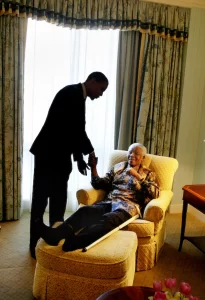
Mandela has stunned countless people across the world. Politicians, non-profit organizations, activists, individuals, tycoons and ordinary souls in various nations have all been astounded by Mandela. His unequalled power not to avenge himself— instead forgiving those who oppressed, tormented and jailed him for around three decades and wholeheartedly focusing on unity and reconciliation— constitutes one of factors of his amazement to the world. This is reflected in an address by the former US President, Barack Obama, on 10 December 2013. As we read it on the White House’s website, he was paying tribute to Mandela who passed away on 5 December.
“To the people of South Africa — (applause) — people of every race and walk of life — the world thanks you for sharing Nelson Mandela with us. His struggle was your struggle. His triumph was your triumph. Your dignity and your hope found expression in his life. And your freedom, your democracy is his cherished legacy.
It is hard to eulogize any man — to capture in words not just the facts and the dates that make a life, but the essential truth of a person — their private joys and sorrows; the quiet moments and unique qualities that illuminate someone’s soul. How much harder to do so for a giant of history, who moved a nation toward justice, and in the process moved billions around the world.”
Obama captured the essence of Madiba’s remarkable life and legacy. “Born during World War I, far from the corridors of power, a boy raised herding cattle and tutored by the elders of his Thembu tribe, Madiba would emerge as the last great liberator of the 20th century.
Like Gandhi, he would lead a resistance movement — a movement that at its start had little prospect for success. Like Dr. King, he would give potent voice to the claims of the oppressed and the moral necessity of racial justice. He would endure a brutal imprisonment that began in the time of Kennedy and Khrushchev, and reached the final days of the Cold War.”
In reflecting on Mandela’s extraordinary contributions, President Obama emphasized the profound impact of his leadership “Emerging from prison, without the force of arms, he would — like Abraham Lincoln — hold his country together when it threatened to break apart.
And like America’s Founding Fathers, he would erect a constitutional order to preserve freedom for future generations — a commitment to democracy and rule of law ratified not only by his election, but by his willingness to step down from power after only one term. We will never see the likes of Nelson Mandela again. But let me say to the young people of Africa and the young people around the world — you, too, can make his life’s work your own.”
Marianne Williamson and General George Washington
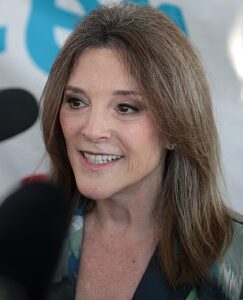
Marianne Williamson is an American author and political activist. She is best known for her books on personal growth and spirituality, including her most famous work, A Return to Love, which explores the principles of “A Course in Miracles.” Williamson also advocated for social and political change, running for the Democratic nomination for President of the United States in 2020.
In her book “ A Politics of Love: A Handbook for a New American Revolution”, she says “A belief in separation is always at the root of a problem, and a realization of our oneness is always at the root of its solution. Any person, economic system, or political establishment that fails to concern itself with the pain of others is out of alignment with spiritual truth. Love not only makes a crisis endurable; it makes it transformable.
We don’t just need a progressive politics or a conservative politics; we need a more deeply human politics. We need a politics of love. Love is the angel of our better nature, just as fear is the demon of the lower self. And it is love, not fear, that has made us great. When politics is used for loveless purposes, love and love alone can override it. It was love that abolished slavery, it was love that gave women suffrage, it was love that established civil rights, and it is love that we need now.”
The very founding father of the United States of America— General George Washington as an American general and commander in chief of the colonial armies in the American Revolution (1775–83) and subsequently first president of the United States (1789–97)— once underscored “love”. He did so in a crucial message “a prayer”— for the fledgling (new and without experience) nation— a letter to all the states communicating his retirement from the military.
The Library of Congress is the national library of the United States and one of the largest and most prestigious libraries in the world. Established in 1800, it serves as the research library for the U.S. Congress. This library contains the message reading “Almighty God: We make our earnest prayer that Thou wilt keep the United States in Thy holy protection; that thou wilt incline the hearts of the citizens to cultivate a spirit of subordination and obedience to government, and entertain a brotherly affection and love for one another and for their fellow-citizens of the United States at large.
And finally that Thou wilt most graciously be pleased to dispose us all to do justice, to love mercy and to demean ourselves with that charity, humility and pacific temper of mind which were the characteristics of the Divine Author of our blessed religion without a humble imitation of whose example in these things we can never hope to be a happy nation. Grant our supplication, we beseech Thee, through Jesus Christ, our Lord. Amen.”
According to Gilder Lehrman Institute of American History, Washington narrates “Of the nine presidents who were slaveholders, only George Washington freed all his own slaves.Washington gradually came to realize that slavery was immoral and contrary to the Revolutionary ideals of liberty and equality. In 1774 he endorsed a document, known as the Fairfax Resolves, which condemned the slave trade as ‘unnatural and recommended that no more enslaved people be imported into the British colonies.
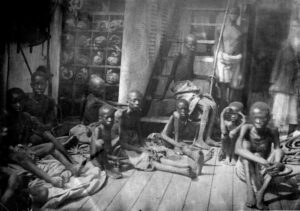
The National Archives of the UK: ref. F084/1310″—EJI’s words and photo.
Five years later, he approved a plan to grant enslaved men their freedom in exchange for service in the Continental Army.Washington never spoke out publicly against slavery. But in this private letter to fellow Virginian John Mercer, dated September 9, 1786, and written at a time when he held 250 men, women, and children in slavery, Washington avows his dislike of the institution of slavery, an institution that violated the ideal of freedom and equality: ‘I never mean . . . to possess another slave by purchase; it being among my first wishes to see some plan adopted by which slavery in this Country may be abolished’.”
Evidence of the power of love
The transformative power of love is not confined to history; it is continuing to shape contemporary movements for justice, freedom, and peace. The very fabric of social change—abolishing slavery, granting women the right to vote, and advocating for civil rights—has been strengthened by the principles of love and mercy.
These movements have gained momentum precisely because love aligns with our deepest humanity. It is a force that unites, heals, and inspires collective action toward a just society. This can even be identified in this information from the Library of Congress. “Although it was the law of the land for more than 300 years, American slavery was challenged and resisted every day, by its victims, by its survivors, and by those who found it morally unacceptable.
The long campaign to abolish the trade in human beings was one of the great moral crusades in U.S. history, and its success was the result of decades of organization and agitation by African Americans and their European American allies. Many enslaved African Americans defied the slave system by leaving it. Escape attempts were dangerous and uncertain, and slaveholders posted substantial rewards for captured fugitives, but every year thousands of enslaved people fled to free states or territories. On the way, they were aided by enslaved people on nearby farms and plantations and by networks of free African Americans and European Americans. By 1860, an estimated 400,000 people had escaped from slavery.”

What is especially powerful about love as a transformative force is its ability to overcome even the most daunting obstacles. When leaders such as Mandela embraced love, they did so not as a sentiment but as a powerful tool to build unity, heal wounds, and advancing justice. This example can serve as a guiding light for our generation, showing that love is not only essential for personal growth but is crucial for societal transformation.
Advisorpedia constitutes an online platform that serves as a resource hub for financial advisors, wealth managers, and other professionals in the financial services industry. On 10 January 2020, it released a story headlined “ Why The Best Leaders Make Love Their Top Priority.”
The story was written by Suzi McAlpine, a leadership development specialist based in New Zealand. With a background as an international executive search consultant, practice leader, business owner and executive coach, Suzi’s passion and skill lies in empowering others to become better leaders. She says “You might think the word ‘love’ has no place when talking about leadership. But I strongly disagree. It has everything to do with it – the best gestures of leadership have always had love at their centre.”
“Love in leadership shows up in many guises – compassion, empathy, courage, kindness and gratitude – to name just a few. Last week, I watched the inspiring and thought-provoking TED talk below about love and leadership.I also got the chance to chat via Zoom with the person who gave the talk, Matt Tenney.What a dude!Matt is the author of ‘Serve to Be Great: Leadership Lessons from a Prison, a Monastery, and a Boardroom’.”
She added that the book is employed in leadership development programs of universities, government bodies, and companies to assist leaders in accomplishing better outcomes while living happier, more fulfilling lives. “Matt is also the founder and CEO of The Generous Group, a marketing company whose primary goal is to create the conditions for world peace by loving employees well, helping employees to become happier, more loving human beings, and by inspiring other leaders and organisations to make love their top priority,” she explained. “His TED talk is about why the best leaders make love the top priority in their organisations.”
Matt then told McAlpine “ Making love the top priority is not a short-term play. If your goal is to build an organisation that lasts and experiences long-term growth and profitability, there is no question that you will be much more likely to achieve those goals if you make love the top priority.
The Harvard study I cited in the talk, although very compelling in terms of the difference in outcomes between ‘people first’ companies and ‘profit first’ companies, is actually a rather weak example in my opinion.I used it in the talk because of the precision with which the study was designed and how dramatic the results were.”
He underlined that that these were not necessarily companies that performed an exceptional job at loving their employees. “They were just companies that were at least intentional about trying to do so. Nevertheless, as I mentioned in the talk, they absolutely crushed their profit-focused competitors.There is a huge body of research correlating taking good care of employees and exceptional long-term business outcomes.”
Call to action
Throughout history, exceptional leaders like Nelson Mandela and Gen. George Washington have been guided by their unwavering love for humanity. Mandela’s fight for justice and Washington’s steadfast dedication to freedom both stand as timeless examples of leadership rooted in compassion. Their selfless commitment to the greater good enabled them to inspire and unite people in the face of overwhelming challenges. Let their legacy remind us that true leadership arises from a deep care for others and a vision of a better world. Embrace this spirit of humanity-driven leadership in your own life and make a difference where it matters most!